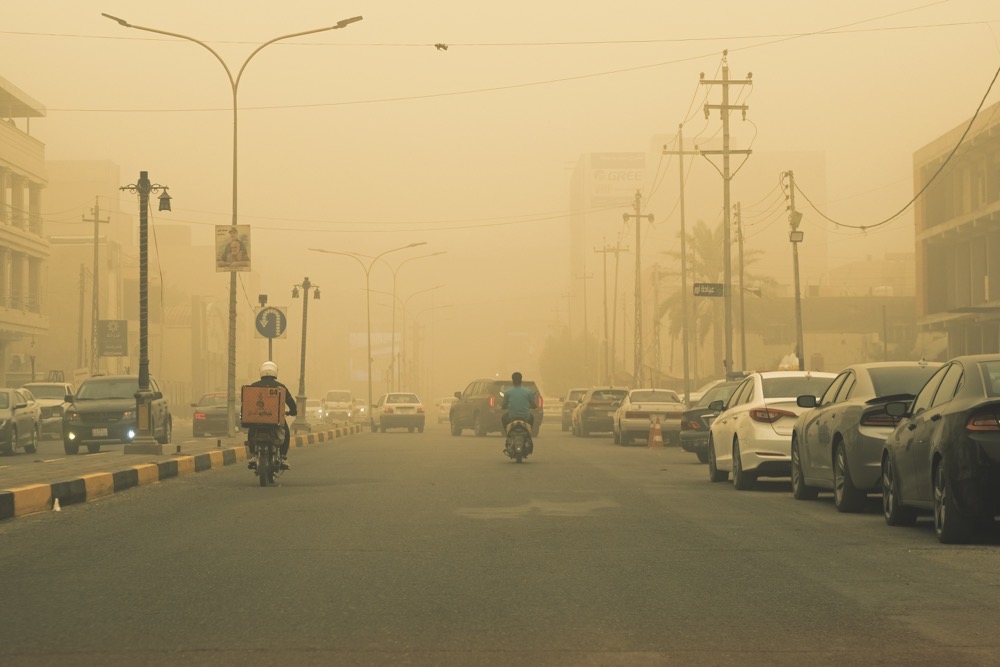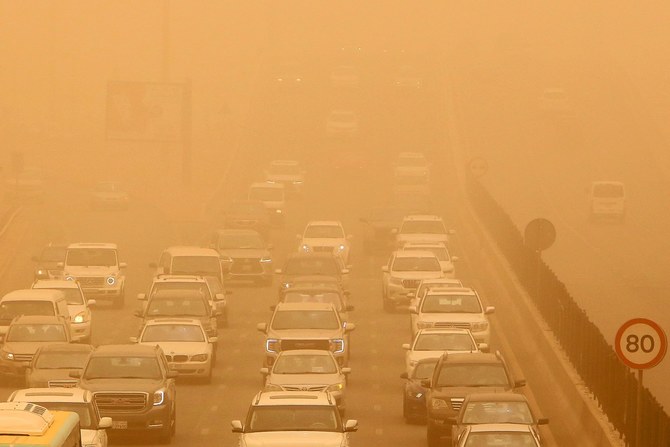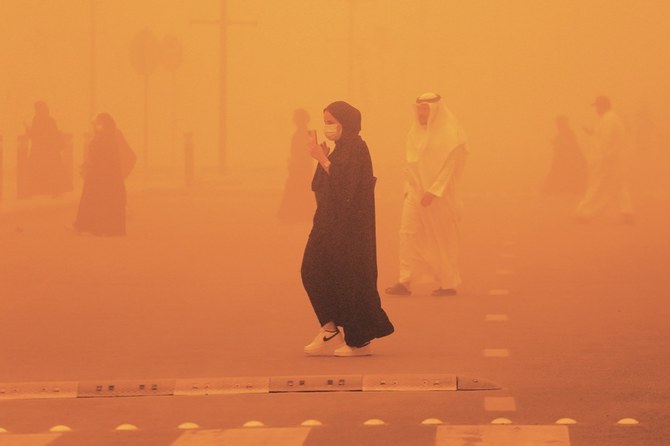DUBAI: Already contending with the combined challenges of rapid urbanization, a warming climate, and stress on freshwater resources, countries across the Middle East and North Africa are now fighting for something even more fundamental — breathable air.
The World Health Organization has warned that nine out of 10 people worldwide breathe polluted outdoor air that exceeds what it deems as acceptable levels, adding that the Arab region in particular has some of the world’s poorest air quality.
With the UN Climate Change Conference, COP28, set to take place in Dubai in November, experts believe not only does the problem of the region’s poor air quality warrant urgent attention, it also requires sustainable and cost-effective solutions.
The 2022 World Air Quality Report, conducted by Swiss firm IQAir, studied levels of PM2.5 (particles small enough to penetrate deep into the respiratory tract and lungs, causing or exacerbating illnesses such as asthma and heart issues) in 7,323 cities across 131 countries, regions and territories.
It found that the most polluted cities in the region are Baghdad in Iraq with an 80.1 average PM2.5 concentration, Manama in Bahrain with 66.6, Kuwait City in Kuwait with 55.8, and Dhahran in Saudi Arabia with 41.5.
Overall, a total of 118 (90 percent) of the 131 countries and regions studied exceeded the WHO’s annual PM2.5 guideline value of 5 µg/m3. (A concentration of 1 µg/m3 means that one cubic meter of air contains one microgram of particulate matter.)

A massive sandstorm advancing into Kuwait City. (AFP)
There is disagreement among experts over why the Middle East appears to suffer from especially poor air quality. Some of them point to such sources of particulate emission as oil-fired power stations, vehicles and heavy industry.
“The main sources of pollution in these cities are energy production, emissions from industrial processes, waste burning, construction and vehicles,” Prof. Tadhg O’Donovan, a solar researcher and deputy vice principal at Heriot-Watt University in Dubai, told Arab News.
“The most critical discussion at the COP28 should be around the use of renewable energy sources.”
Sulfur dioxide, nitrogen oxides and soot are some of the many pollutants that are released into the atmosphere by the combustion of conventional (fossil) fuels and contribute to poor air quality.
The combustion of fuels also releases a number of gases — such as carbon dioxide, methane and nitrous oxide — into the atmosphere that contribute to a greenhouse effect and thus global warming.
“These greenhouse gases have a long half-life in the atmosphere ranging from decades to centuries,” Dr. Aseel Takshe, head of department and associate professor of public health at the Canadian University of Dubai, told Arab News.
While transparent discussions regarding the future of conventional fuels have been ongoing, Takshe believes significant action is yet to be taken to mitigate their environmental impacts. “More commitment to renewable energy is urgently needed,” she said.
Other scientists regard the Middle East’s frequent sand and dust storms as the most significant contributor to poor air quality. Rising average global temperatures and creeping desertification are believed to have increased the frequency of such storms, which cause and exacerbate respiratory illnesses.
Although Middle Eastern civilizations have experienced dust storms for thousands of years, post-industrial desert dust storms are different, lifting a growing load of airborne pollutants and transporting these substances over long distances.
Dust storms therefore magnify the problem of poor air quality, skewing the figures against Middle Eastern cities regardless of their emission-reduction policies.

Corniche Skyscrapers in Abu Dhabi during a severe sand storm. (AFP)
“The unique challenges faced by the region, including high temperatures and frequent dust storms, should not be overlooked,” Yousuf Fakhruddin, CEO of Fakhruddin Properties and developer of clean-air technologies, told Arab News.
He said strategies for managing these issues, such as improved meteorological forecasting and infrastructure design, will become vital for protecting air quality and public health in the future.
Depending on levels of air pollution, people’s lives can be impacted in various ways. From a reduction of life expectancy by two to five years to a range of chronic health conditions, prolonged exposure to high levels of air pollution can have devastating effects on population health.
“Respiratory diseases, including asthma and chronic obstructive pulmonary disease, are among the most common. These conditions can significantly reduce quality of life, and in severe cases, can be fatal,” said Fakhruddin.
Furthermore, cardiovascular diseases, including heart disease and stroke, have been linked to air pollution exposure. This is because pollutants can cause inflammation and damage to the cardiovascular system over time, increasing the risks.
In fact, research suggests that long-term exposure to certain air pollutants may even increase the risk of lung cancer, and emerging evidence suggests that air pollution may be linked to mental health issues and neurodevelopmental disorders in children.
INNUMBERS
• 270,000 Estimated deaths per year caused by air pollution in the MENA region.
• $141bn Annual cost of air pollution in MENA (representing 2% of regional GDP).
• 60 Average number of days a MENA resident reports sick in their lifetime due to exposure to elevated air pollution levels.
Source: World Bank
“It’s worth noting that the average person inhales approximately 11,000 liters of air each day,” said Fakhruddin.
“When this air is polluted, it means we’re introducing harmful substances into our bodies in large quantities every single day, which only amplifies the health risks.”
Mindful of the need to simultaneously reduce harmful emissions, the Gulf region has made improving air quality a high priority by seeking to cut vehicular exhaust emissions and halt the release of pollutants into the atmosphere.
O’Donovan highlights the Middle East’s targets for the transition to renewable energy, with the UAE aiming to increase the use of renewables as part of its energy mix to 44 percent by 2050, while Saudi Arabia is targeting 50 percent by 2030.
Gulf countries will most likely boost their renewable energy capacities primarily through solar and wind power, says O’Donovan, citing the twin advantages of the region’s climatic conditions and the falling price of such infrastructure.

Murky skyline of the Egyptian city of Giza. (AFP)
Saudi Arabia is building one of the world’s biggest green hydrogen facilities, which will be powered by 4 gigawatts of solar and wind energy and will be operational by 2025. The NEOM project’s plant is expected to create 650 tons of green hydrogen per day.
The Kingdom is building wind farms in Yanbu, Waad Al-Shamal and Al-Ghat. Dumat Al-Jandal, the Middle East’s largest wind farm and the first in Saudi Arabia, began producing 400 megawatts of carbon-free energy in August 2021.
The UAE’s Mohammed bin Rashid Al-Maktoum Solar Park, the world’s largest single-site facility of its kind, is another key project, which aims to generate some 5,000 megawatts by 2030.
To address the issue of clean air, the UAE has launched the National Air Quality Agenda 2031 — a comprehensive plan to monitor and manage air quality across the country, providing real-time data in the country.
“This information is then shared with the authorities to help them develop policies on air-pollution control as well as enabling researchers and academicians to study the impact of environmental factors, industrial progress and population density on air quality,” said O’Donovan.
The issue goes beyond energy production. According to Fakhruddin, improving industrial emission standards is a critical issue that requires discussion at the upcoming COP28 summit.
“Many industries currently emit large quantities of pollutants with minimal regulation or oversight,” he said. “Implementing and enforcing stricter emission standards could significantly improve air quality.”
He also believes sustainable urban development should be a priority, with a focus on green building practices, efficient public transport networks, and greening initiatives.
Saudi Arabia’s capital, Riyadh, has launched a greening initiative to boost plant cover. As part of the Saudi Green Initiative, the Kingdom aims to plant 10 billion trees, with 7.5 million for Riyadh and its surroundings.

Electric vehicles could make a dent in pollution caused by car exhaust. Supplied)
The project is transforming Riyadh into an environmentally friendly metropolis with a high quality of life, reducing the capital’s energy consumption by easing ambient temperatures, and ultimately reducing healthcare expenditure.
Experts say a single hectare of land, when 11 percent of it is covered by plants, can remove 9.7 kg of air pollutants every year.
Saudi Arabia is also collaborating with other Arab governments on a Middle East Green Initiative, which includes a pledge to plant an additional 40 billion trees, the world’s largest afforestation effort.
The initiative could reduce land degradation and desertification in the process, thereby cutting the scale and frequency of dust storms.
Another important topic of discussion at COP28 will likely be how public-private partnerships can enable initiatives that improve air quality, according to O’Donovan of Heriot-Watt University.
“Some examples of potential initiatives are subsidies for the manufacture and use of electric vehicles, investing in renewable energy projects, collaboration for infrastructure projects that support pedestrian traffic and encouraging innovation aimed at addressing local air quality issues,” he said.
Fuse EV Conversions, a company that converts car engines from petrol to electric, is an example of how private enterprise can help to accelerate the Arab region’s energy transition.
“The current costs of electric vehicles are prohibitive,” Salman Hussein, founder and CEO of Fuse EV Conversions, told Arab News.

A sandstorm engulfs the Iraqi city of Basra. (AFP)
To capitalize on the opportunity, “we are developing conversion kits and working with regulators to roll out our services in more cities,” he said.
While many of the firm’s customers are classic car owners, it is also working on solutions for other applications such as the commercial sector, defense and NGOs.
Viewing the upcoming COP28 event as an opportunity for the region to address its sustainability challenges, Hussein believes governments should pay attention to practical steps by which environmental and climate goals could be reached.
“While billions of dollars have been prioritized toward sustainability, we should also explore ways to adapt existing solutions,” he said, adding that if costs borne by consumers are reduced tangibly, clean mobility goals could be achieved much faster.
“Here in the GCC, Saudi Arabia and the UAE have committed to net-zero carbon goals, and they are already transitioning to clean-energy solutions. This inspires confidence and, together with the clean tech ecosystem, we can create unparalleled impact.”
















